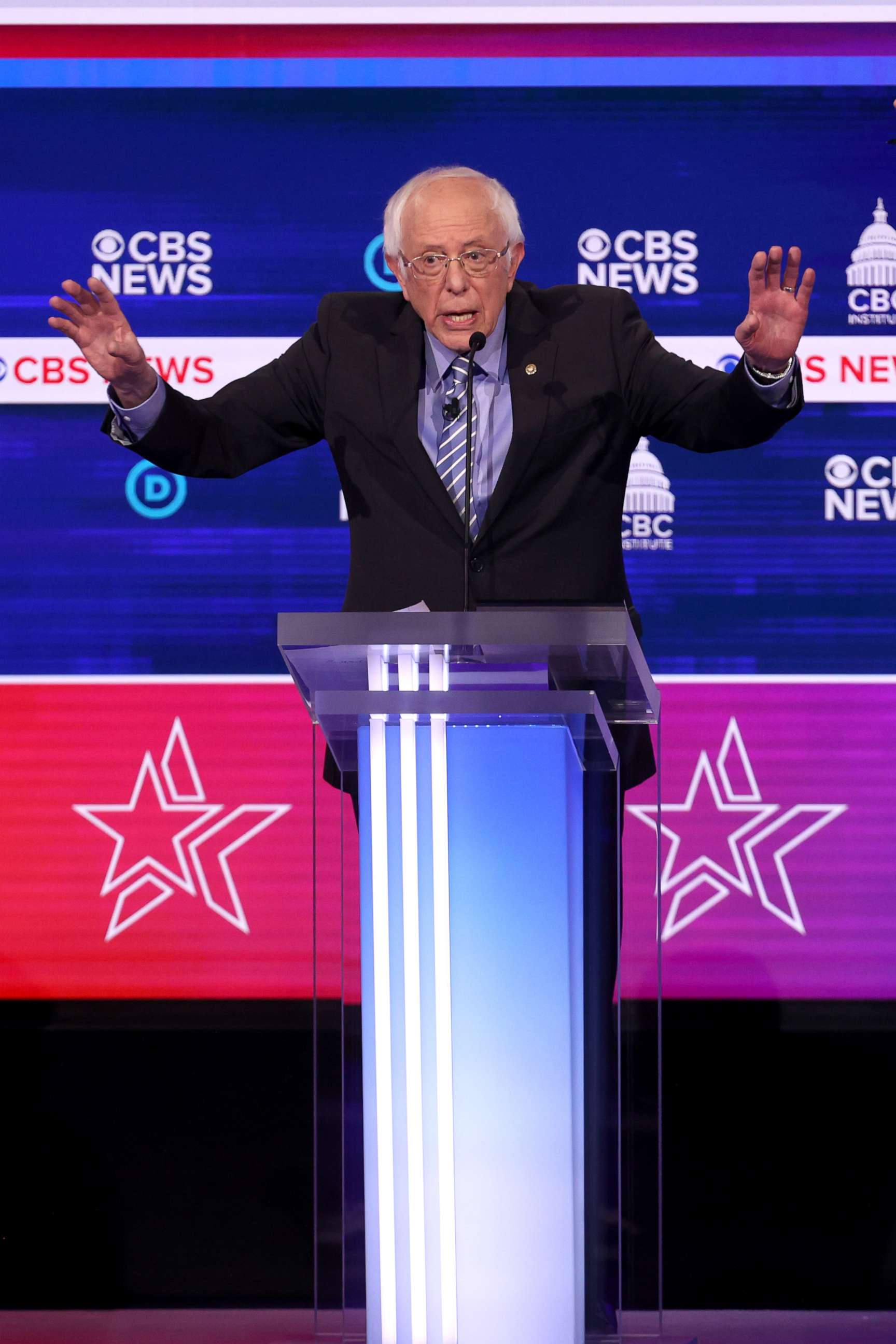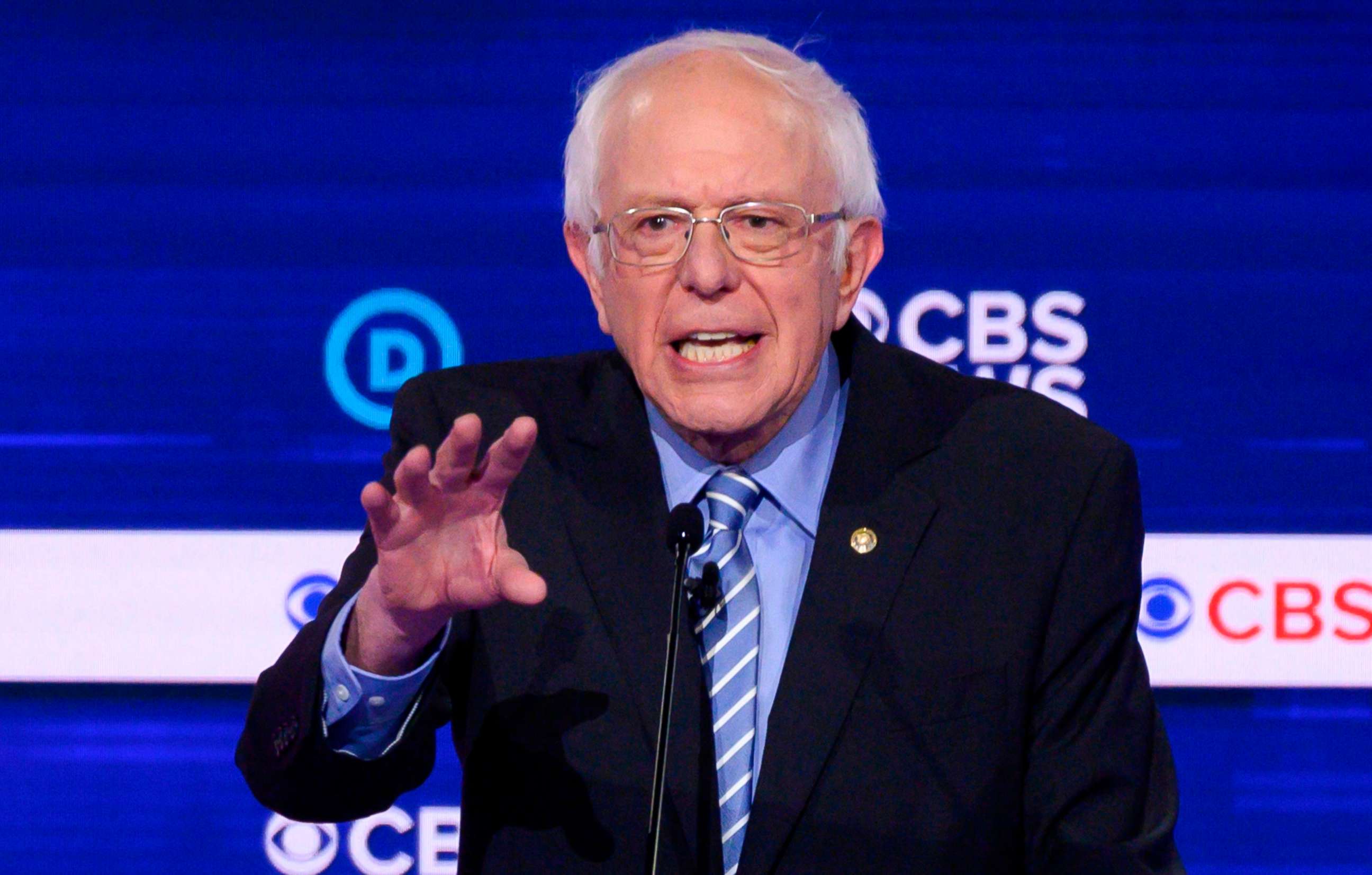Newly revealed letter highlights Sanders' complicated history on gun control
In debate, Sanders conceded a 'bad vote' to give gun makers immunity.
At Tuesday night’s Democratic presidential debate, the audience booed Sen. Bernie Sanders after a rival noted his vote for a 2005 bill that shielded gun manufacturers and dealers from being held liable for crimes committed with weapons they made and sold.
Sanders launched into a full-throated response to the attack, acknowledging he had cast a “bad vote,” but disputing the idea that he had been soft on gun issues and had opened the door for high-powered weapons to be used in mass shootings.
"Because of all these disgusting and horrific mass shootings, the American people now understand that we must be aggressive on gun safety, not be dictated to, by the NRA," Sanders said. "I am proud that I have a D-minus voting record from the NRA -- if elected president, it will get worse than that."
The issue has the potential to dog the Democratic front-runner, who has spent a career navigating a nuanced course on gun control measures popular with many primary voters, but less appealing to his constituents in rural Vermont.

In a 1991 letter he wrote to a gun shop owner in Burlington, obtained by ABC News and not previously reported, Sanders put his mixed feelings about gun control measures into words. Over the course of the letter, Sanders writes that he is against a “one-size-fits-all policy,” that he “opposed the ‘Brady Bill … [and] the seven-day waiting period.” He writes that he would “support an assault weapons ban” so long as it did not permit Treasury Department officials to add additional models of weapons to the ban and providing the ban expired in three years.
He concludes by writing that he would ultimately be voting against the ban -- because it was part of a larger crime bill, which had other provisions he did not like.
The letter lays out an approach that has sent mixed signals to voters who are trying to evaluate his stance. While he has, as he said in the debate, amassed a record disliked by the National Rifle Association, he has not always voted in step with those advocating gun control, including the 2005 vote backing legislation that shielded gun manufacturers from lawsuits filed by victims of gun crime. And he has, over decades, remained largely silent about the presence just north of Burlington of one of the nation’s largest manufacturers of military-style assault rifles – which made the weapons used in two mass shootings last summer.
One of his rare public statements about the factory came in 2012, after the Sandy Hook school shooting, in which Sanders appeared to defend the Century Arms factory. The statement -- issued with two other Vermont lawmakers -- came after critics raised questions about the manufacturer.
“They [Century Arms] are engaged in a lawful business just as other are that are involved in firearms commerce, employing many Vermonters,” the statement read. “And if Congress approves new steps to address gun violence, we are confident that Vermont businesses would comply with them.”
Sanders' record on guns
When Elizabeth Deutsche, a nurse and community advocate, went to the state capitol to urge the state legislature to pass gun control legislation, she appeared at the same witness table as Henry Parro, a gun shop owner who was there advocating for votes against the bill in 2018.
Deutsche and Parro couldn’t be farther apart in their views on how gun control ought to be legislated, but they do seem to agree on one thing: Sanders.
They both believe Sanders has crafted his stance on gun issues based on political winds, not passion.
Parro said Sanders has ditched pro-gun rights positions that were popular with many Vermont voters, and adopted a more strident gun control stance to suit his bid for president – and satisfy a more liberal national primary audience.
“I think he is giving lip service to the Democratic party,” Parro said. “Some of his voting record shows it goes completely against, if you go back to the beginning, his core values.”
Deutsche sees those past conservative votes that Parro liked as troubling. It’s a record that make it hard for her to see him as a reliable advocate going forward.
“Senator Sanders uses our rural state with a large number of sportsman and hunters to justify his previous weak stance on gun control," Deutsche said. "As a gun owner, I can't stand behind that and I don't accept his justification for that."
Parro’s gun shop in Waterbury, Vermont, sells hunting and defense firearms, as well as military-style AR-15 rifles produced by Century Arms. He still remembers a different kind of relationship between Sanders and guns. It’s a relationship that Parro says once won Sanders the favor of the NRA helped get the once little-known political hopeful elect.
Sanders lost his first bid for the House of Representatives to Republican Peter Smith after campaigning in favor of an assault weapons ban in 1988, which he highlighted during Tuesday night's debate.
"Thirty years ago, I likely lost a race for the one seat for Congress in Vermont because 30 years ago,I supported a ban on assault weapons," Sanders said. "Thirty years ago," he repeated.

But after Smith voted in favor of an assault weapons ban on the Hill, the NRA ran ads targeting Smith’s re-election bid in 1990. Though the NRA didn’t endorse Sanders for the House seat, and the earliest rating he received from the NRA came two years later -- a "D" -- he did benefit from the NRA’s attacks on his opponent.
"We don't like everything that Mr. Sanders has to say about firearms," James Baker, an NRA lobbyist, told a local newspaper in 1990. "But he's been up front about it. He's at least as good, if not better, than Mr. Smith."
Sanders unseated Smith that year. He held that seat until 2006, when he was elected to the Senate where he’s served ever since.



